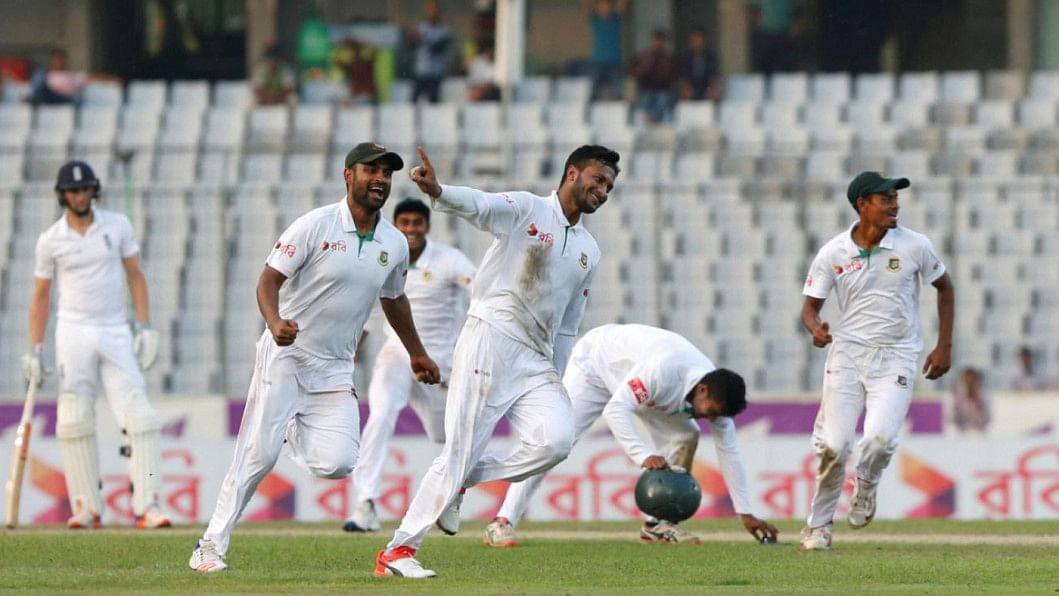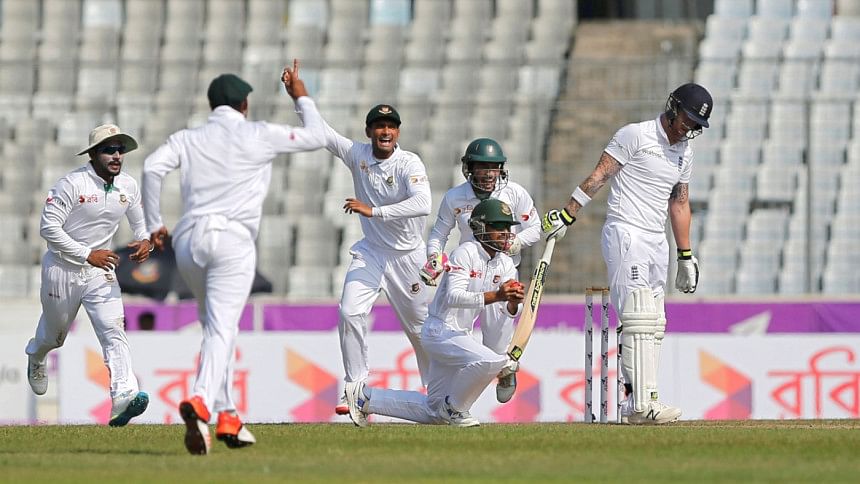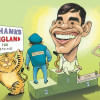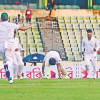This was not a Test Eng lost, but one which Tigers won

Bangladesh have not been given their due for the magnificent manner in which they beat England in a Test match.
With a little luck, they could have claimed the series 2-0, and fixed, at least temporarily, the tone of condescension that accompanies them in world cricket, reports The Hindu.
They have won six one-day series in the last couple of years, and in that format have had enough victories in enough tournaments to be taken seriously. But Test cricket is another matter.
England skipper Alastair Cook can be forgiven for harping on his side's drawbacks rather than giving full credit to the hosts who dismissed his entire team in one session in Mirpur. He has to keep the team's morale up as they prepare for a five-Test series in India.
Any suggestion other than that the result is an aberration wouldn't do his troops any good. They have to believe it was just one of those things. Or, as Cook said, "Sometimes you have to remember it's just a game of cricket." This is the consolation of losers.
The slow turners meant that the two Tests were competitive, and showed up England's twin problem — the lack of quality spinners and the lack of batsmen to play quality spin.
Lasting image
The lasting image of the first Test in Chittagong will be Joe Root consoling Sabbir Rahman after the batsman's unbeaten 64 just failed to take Bangladesh home.
Flintoff shaking hands with a distraught Brett Lee at the end of the 2005 Edgbaston Test Australia lost by two runs is better known, but I would like to believe the emotions in the two pictures are the same. Consolation from professional to professional.
Ben Stokes might have had a few run-ins with Sabbir which led to a code violation and docking of 15 per cent of his match fees, but his response to messages of gratitude from the Bangladeshi fans and players was warm: "Thanks for having us Bangladesh," he tweeted. "been a brilliant series, salute to the security and the people…"
A bomb blast in a café in July which killed 20 had nearly scuttled the tour, but England endeared themselves to the fans not just by losing to their national team, but by turning up at all. It was important that they toured, and perhaps even more important that Bangladesh won a Test with a young, spirited side.
A winner's mindset
Bangladesh won because they thought – and prepared – like winners. They prepared turning wickets for their bowlers, which was a departure from the traditional tactic of having flat tracks in the hope that batsmen might get lucky and force a draw.
Bangladesh's spinners were buoyed by this vote of confidence in their ability. In the two Tests they claimed all 40 wickets, the spinners 38 of them.
India took 20 years to beat England in a Test match, New Zealand 48, and South Africa 17, so Bangladesh's 13 is impressive (they first played England in 2003, although their inaugural Test was in 2000 against India).
Mehdi Hasan Miraz, the star of the series is only 19 and still learning his craft. His 19 wickets in a short debut series is remarkable enough; three five-wicket hauls in his first two Tests places him on a par with all-time greats Clarrie Grimmett, Tom Richardson, and S.F. Barnes.
Mehdi, the son of a truck driver, is by all accounts a cricket obsessive like a majority of his countrymen, and is expected to spearhead the bowling alongside the left arm medium pacer Mustafizur Rehman.
Much-needed catalyst
It took Bangladesh a while to understand the nuances of the five-day game — initially they tended to be competitive for two or three days and then fizzle out. And they lost the tight games. Now they have the team and the confidence of a major win to back them.
Many of Bangladesh's top players, Emanul Haque, Mohammed Ashraful, Mushfiqur Rahim, Mashrafe Mortaza, Tamim Iqbal, made their debut aged 17 to 19. But these are the success stories. An equal number who began with promise also faded away.
Bangladesh have always had a competitive Under-19 side, rather like Sri Lanka in the days before they gained Test status, but a combination of lack of opportunity and paucity of competitions has meant many have slipped through.
The Mirpur win will rejuvenate a system used to sporadic success as the team understands the importance of consistency.
Before Bangladesh visit India for their first Test here in February, they play a two-Test series in New Zealand.
England arrive in India and take on Ravichandran Ashwin. It cannot be much of a morale-booster that you go from a defeat engineered by a 19-year-old to face the leader of his tribe. But it is useful to remember that England have only one way to go from here, and that's up. Sometimes a defeat brings a team together in unexpected ways.
Bangladesh have arrived. Right now they need not worry too much about proving themselves by winning abroad. It took India 36 years, after all.
The Mirpur win will rejuvenate a system used to sporadic success as the team understands the importance of consistency

















Comments